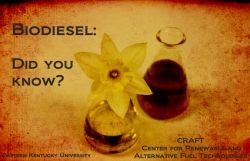Biodiesel: Who Uses It?
Did you know there are many programs and organizations in the United States that are switching to biodiesel? This isn’t a recent change. Some companies have been undergoing the process of switching to a cleaner, more sustainable alternative fuel for years now. And it’s not only large corporations making this transformation— individual citizens, schools, and even some pro sports teams are joining in on the worldwide effort to create a better environment in which to live! These are only a few examples of the groups who are using biodiesel:
1. L.L. Bean, Freeport, ME
L.L. Bean, headquartered in Freeport, Maine, converted its heavy-duty truck fleet to biodiesel fuel in 2003. Biodiesel is also used in the company's fleet of buses. In 2009, the company used nearly 14,000 gallons of biodiesel, mostly B20.
Click here to learn more!
2. Biodiesel Motorist— Jenna Higgins Rose
Jenna Higgins Rose, Director of Communications for the National Biodiesel Board from 2000-2010, fuels her 2004 diesel sedan with B20.
"From a performance perspective, I never notice a difference between my diesel car and a gasoline car," she said. "It starts just as fast, it runs just as quietly and it has never frozen up on me, even after being parked at the airport for two weeks in the dead of winter."
What she does notice is a difference in fuel economy. "My diesel gets 30 percent better mileage than the same model with a gasoline engine. I can go almost 600 miles on a single tank of fuel. That's as good as a hybrid."
Click here to read more about this economically conscious citizen!
3. Kentucky School Systems
Several school systems located throughout Kentucky have signed on to use biodiesel fuel, either in a 20% blend with regular diesel (B20) or in a 2% blend with regular diesel (B2).
Campbell County, McLean County, and Hardin County Schools are just a few of the schools that participated in the project. A total of 300 buses in these regions are using B20, and a total of 50 buses are using B2. These buses serve a total of 35,500 students, transported daily by the fleets in these five school systems. These biodiesel school bus demonstrations are part of a larger demonstration program that also includes a state park (Lake Barkley State Resort Park), a university (Murray State University), and an electric co-op (the East Kentucky Power Cooperative). According to Melissa Howell, Executive Director of the Kentucky Clean Fuels Coalition (the Clean Cities Coalition in Kentucky), the full demonstration program will displace approximately 60,000 gallons of diesel fuel, resulting in emissions reductions of about 150 pounds of particulate matter, 160 pounds of sulfur dioxide, 200 pounds of hydrocarbons, and 1,800 pounds of carbon monoxide.
For much more information on this story, click here.
4. Cincinnati Reds
The Reds' Great American Ball Park is among the greenest ballparks in the country. Their efforts range from composting the grass clippings to using biodiesel blends for facility vehicles and standby emergency generators. Also, the park collects waste cooking oil from their kitchens and concession stands for biodiesel producers to use in making the fuel. In the last season, the Reds have sent 8,234 gallons of used cooking and motor oils, some to be refined for biodiesel. They use biodiesel blends in field and facility maintenance vehicles and equipment, tractors, and stand-by emergency generators.
"In the global effort to be more environmentally friendly, the Cincinnati Reds believe that the use of biodiesel as an alternative fuel source is an important part of our overall greening strategy," said Declan Mullin, Vice President, Ballpark Operations.
Click here for even MORE ways the Reds are becoming a greener team!
5. Robins Air Force Base, GA
The Green Procurement Program Team at Robins Air Force Base, Ga. was awarded the prestigious White House Closing the Circle Award in 2008 and 2009 in the green purchasing category. Their far-reaching environmental accomplishments include the use of B20 in all diesel equipment such as tugs, which pull aircraft to position, and refuelers, capable of carrying 6,000 pounds of jet fuel to awaiting aircraft.
For more information on this story, including other biobased awards given to other agencies, click here.
Contact Information
Miranda Small
Miranda_Small3@eku.edu
Published on November 01, 2011
